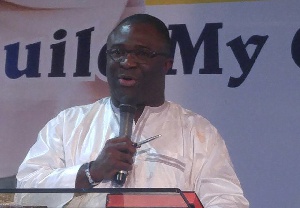 Deputy Minister of Works and Housing, Eugene Antwi
Deputy Minister of Works and Housing, Eugene Antwi
The Deputy Minister of Works and Housing, Eugene Antwi, has allayed fears that the implementation of the Investment Promotion Centre Act was a deliberately malicious one, meant to target foreigners, especially Nigerians.
Recounting Ghana’s long history as a signatory to the ECOWAS protocols on the free movement of goods and persons, he denied all allegations that he move was a protectionist one.
He made the comments when he gave a speech on behalf of the government delegation which had graced the events to mark the Independence Day celebrations at the Nigerian High Commissioner’s residence.
The Nigerian High Commissioner to Ghana, Olufemi Michael Abikoye, for his part, lauded the cordial relationship between the governments and people of the two countries.
Delivering the main address to mark the 58th Independence Anniversary celebration of Nigeria, Abikoye told the story of a resurgent Nigeria under the leadership of Mahammadu Buhari, a Nigeria which had been saddled with a myriad of problems since its attainment of independence in 1960, now getting back on its feet.
“There is no gainsaying the fact that the present government under the able leadership of President Muhammadu Buhari has, indeed, brought renewed hope in restoring our security, rebalancing our economy and tirelessly fighting corruption to almost a standstill.”
He congratulated the Nigerian Armed Forces for successfully repelling the threat that the Boko Haram group had posed. With attacks now reduced to sporadic forays on soft targets in remote parts of the country.
“Nigeria must be grateful to our gallant armed forces for rolling back the frontiers of Boko Haram terrorism, defeating them and reducing them to cowardly attacks on soft and vulnerable targets,” he said. He expressed gratitude to their neighbours and the international community for its support in fighting the menace of modern day terrorism.”
He was full of praise for the economic policies instituted by the current Buhari administration which, he claimed, had turned around the fortunes of the Nigerian state.
He described as an “outstanding success,” the federal government’s Agricultural Anchor Programme which was instituted in November 2015, with various initiatives to enhance shared sufficiency in food production and exports.
He also claimed that since December 2017, over seven million 50kg bags of fertilizer had been produced through this initiative, stating that $150 million had been saved through this same venture. The federal government had also saved a further $60 billion dollars being saved on subsidies on fertilizers.
He revealed the federal government’s plan to establish a new presidential initiative to employ 10,000 Nigerian youth with the aid of the Central bank of Nigeria’s development finance initiative.
On the issue of corruption, he was ebullient about the chances of success of the present administration’s attempts to eradicate the menace from Nigerian society even while sounding a realistic note about the resistance that corrupt elements would put up.
He indicated the Buhari administration’s determination to win the battle against corruption through the institution of several anticorruption policies like the Whistle Blower Act and the adoption of a modern payroll system across the country.
Homing in on Ghana-Nigeria bilateral relations, he said “as the two largest economies, the relations had been optimized by the resounding successes being recorded in peaceful negotiations and resolutions of mutually beneficial issues through the newly rebranded Nigeria-Ghana Joint Commission. He marked the depth of the relationship between the two neighbours which had seen citizens from either country adopting the other country as their second home.
Much as he praised the cordial relationship between the two states, he did cite the implementation of the 1994 Ghana Investment Promotion Centre Act 478 as a point of irritation in the brotherly relations between the two nations. He, however, assured all sides in the conflict that the issues were being resolved and that the two governments were working to build better trade relations.
This year’s celebrations were held under the theme, ‘harnessing our resources for national development’.